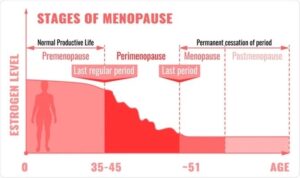Menopause Flu
Menopause, a natural biological transition marking the end of a woman’s reproductive years, often brings about a myriad of physical and emotional changes. While most people are aware of common symptoms like hot flashes and mood swings, one lesser-known but equally challenging aspect is what some refer to as the “menopause flu”.
As a naturopath and nutritionist who has recently transitioned through menopause myself, I understand firsthand the challenges that come with this significant life stage.
What is Menopause Flu?
The phenomenon often dubbed as the “menopause flu” can be perplexing. It’s like experiencing flu-like symptoms – perhaps a fever, chills, shivers, aches, and overwhelming fatigue – without the typical accompanying symptoms like a runny nose or cough. It’s a puzzling experience, leaving you feeling off-kilter, knowing something’s amiss but unable to pinpoint exactly what.
This sense of malaise is frequently an extension of fatigue, your body’s way of signaling it’s reached its limit and pleading for respite. It’s often a one-off occurrence, triggered by periods of intense activity or stress – whether physical or emotional. But if these symptoms persist, refusing to relent, it’s essential to heed the warning signs.
They could indicate an underactive thyroid, a condition exacerbated by the declining estrogen levels synonymous with perimenopause and menopausethe drop in estrogen levels can compromise our immune system’s efficacy, leaving us vulnerable to every bug and virus that crosses our path. This susceptibility to illness can be draining, both physically and emotionally.
The term “menopause flu” is colloquially used to describe a cluster of symptoms that mimic those of the flu but are actually related to hormonal changes during menopause. These symptoms can vary from person to person but commonly include:
- Fatigue: Feeling unusually tired or exhausted despite getting enough sleep.
- Muscle and Joint Pain: Experience stiffness, achiness, or soreness in muscles and joints.
- Headaches: Frequently experiencing headaches or migraines.
- Nausea: Feeling queasy or experiencing an upset stomach.
- Chills and Night Sweats: Experiencing sudden bouts of feeling cold or experiencing night sweats similar to those during a fever.
- General Malaise: Feeling generally unwell without a clear cause.
What Oestrogen is doing
During menopause, the body undergoes a profound hormonal shift, with oestrogen levels declining significantly. Ostrogen, a pivotal hormone in the female reproductive system, orchestrates a symphony of physiological processes beyond its role in menstruation and fertility. It acts as a versatile regulator, influencing everything from temperature control and sleep patterns to mood stability and immune function.

Temperature regulation is one of oestrogen’s primary domains. It helps fine-tune the body’s internal thermostat, ensuring that we maintain a stable core temperature. However, as oestrogen levels decline during menopause, this finely tuned mechanism can become dysregulated. The result? Fluctuations in body temperature that mimic the feverish sensations of the flu, with sudden bouts of heat (hot flashes) or cold (chills) disrupting our sense of equilibrium.
Oestrogen’s influence extends far beyond temperature control. It also plays a pivotal role in modulating sleep patterns, promoting restorative sleep and regulating circadian rhythms. As oestrogen levels decline, sleep disturbances become more common, with many women experiencing insomnia, night sweats, and disrupted sleep architecture. These sleep disruptions can compound feelings of fatigue and malaise, further resembling the exhaustion associated with the flu.
Moreover, oestrogen exerts a profound influence on mood regulation and cognitive function. It helps maintain neurotransmitter balance, including serotonin and dopamine, which are crucial for mood stability and emotional well-being. Declining oestrogen levels during menopause can disrupt this delicate balance, contributing to mood swings, irritability, and feelings of depression—analogous to the emotional upheaval often experienced during bouts of illness.
Additionally, oestrogen’s impact on immune function cannot be overstated. It plays a vital role in modulating the immune response, helping to fend off infections and maintain immune homeostasis. As estrogen levels decline, the immune system’s vigilance may wane, leaving women more susceptible to viral and bacterial infections. This increased vulnerability to pathogens can manifest as a heightened susceptibility to colds, flu-like symptoms, and other infectious illnesses during menopause.
In essence, the decline in oestrogen levels during menopause precipitates a cascade of physiological changes that can disrupt the body’s delicate balance. From temperature dysregulation and sleep disturbances to mood swings and compromised immune function, these flu-like symptoms are a manifestation of the body’s response to hormonal fluctuations. Understanding the multifaceted role of estrogen in regulating these processes sheds light on the complex interplay between hormones and health during menopause.
What you can do to minimise symptoms Menopause Flu ?
Hydration and Nutrition:
Prioritise hydration and nourishment with a focus on whole, nutrient-dense foods.
Opt for ample water intake, complemented by herbal teas, and include hydrating fruits and vegetables in your diet.
Include anti-inflammatory staples like turmeric, ginger, and omega-3-rich fatty fish to alleviate muscle and joint discomfort, fostering overall well-being.
Reduce inflammatory foods and drinks. Things like sugar, refined carbohydrates, processed foods and alcohol.
Movement and Mindfulness:
Cultivate a holistic approach to well-being through regular physical activity and mindfulness practices.
Engage in activities that invigorate your body and uplift your spirit, whether it’s the gym, nature walks, or spontaneous dance sessions.
Pair these movements with mindfulness techniques such as deep breathing or reflective journaling to foster inner calm and resilience amidst life’s transitions.
Herbal Support:
Harness the healing potential of herbal allies to navigate the nuances of menopausal transition.
Traditional herbs like black cohosh, red clover, and dong quai have been revered for their ability to alleviate menopausal symptoms.
Consult with Leah now for a personalised plan.
Community and Connection:
Foster a sense of belonging and mutual support by connecting with others on similar journeys.
Seek out online forums, local support groups, or women’s circles where you can share experiences, exchange insights, and draw strength from collective wisdom.
Building a community of like-minded individuals can provide invaluable emotional support and empower you to navigate menopause with grace and resilience.
Other Menopause Symptoms
Other than menopause flu here are some other common menopausal symptoms.
– Hot flashes
– Night sweats
– Irregular periods
– Vaginal dryness
– Mood swings
– Fatigue
– Insomnia
– Weight gain
– Hair thinning or loss
– Dry skin
– Joint and muscle aches
– Memory problems
– Difficulty concentrating
– Changes in libido
– Urinary incontinence
– Headaches
– Breast tenderness
– Digestive issues
– Increased susceptibility to urinary tract infections (UTIs)
– Anxiety or depression
Meet Leah, a seasoned naturopath and nutritionist who brings a wealth of experience and compassion to her practice. With a deep understanding of holistic health and a passion for empowering others, Leah has dedicated her career to supporting individuals on their journey to wellness.
Having traversed the transformative terrain of menopause herself, Leah brings a unique perspective to her work. As she navigated the complexities of this life stage, she discovered firsthand the power of natural strategies in promoting physical and emotional well-being.
Drawing upon her expertise in naturopathy and nutrition, Leah provides personalised guidance tailored to each individual’s needs.
With warmth, empathy and no judgment, Leah creates a supportive space where clients feel heard, valued, and empowered to take charge of their health. Whether it’s crafting personalised wellness plans, exploring herbal remedies, or fostering community connections, Leah is committed to guiding her clients toward vibrant health and vitality.
In addition to her clinical practice, Leah is a passionate advocate for health through her writing and speaking engagements, she strives to raise awareness about holistic approaches to menopause and inspire others to embrace this transformative journey with grace and resilience.
With Leah as your guide, you’ll embark on a transformative path toward greater health, vitality, and well-being.
